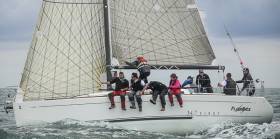Displaying items by tag: Gibney Classic
Double Header Weekend for Howth With Start of Autumn League and Rescheduled Gibney Classic
With the forecast showing the makings of an Indian summer, Howth Yacht Club is looking forward to decent weather for the start of its Autumn League in just two weeks’ time on Saturday 16 September.
While Howth’s keelboats are understandably focusing their attention on next week’s ICRA Nationals, the club is encouraging boats to join Checkmate XX — recently the overall winner in the offshore fleet at the Volvo Dun Laoghaire Regatta — and others in the Autumn League as soon as possible so the class bands can be sorted ahead of the first race.
Keelboat crews can read the Notice of Race and sign up on the HYC website HERE.
This year’s Autumn League runs over six Saturdays from 16 September to 21 October: six individual race days with first gun at 1400 (except for the final race on 21 October with first gun at 1300).
With the rugby on most Saturdays, there will be a lively après-sail scene at the clubhouse where the bar will have weekly drink specials.
And the opening weekend will be a something of a double header, with the rescheduled Gibney Classic, previously set for early August, confirmed for Sunday 17 September. Online registration, the Notice of Race and entry list are on the HYC website.
Open Entry for Howth Yacht Club’s Gibney Classic 2023
Entries are now open for Howth Yacht Club’s Gibney Classic on Saturday 5 August.
Sponsored by Gibbey’s Pub of Malahide, the renowned ‘Northside’ keelboat regatta is an open event with a low entry fee — just €10 — to promote inclusiveness for what’s annually proved to be an unforgettable day of racing, camaraderie and celebration.
The Gibney Classic is also part of HYC’s Fingal Cruiser Challenge series, attracting a highly competitive fleet alongside boats from the HYC Cruising Group and Malahide Yacht Club.
Indeed, all manner of boats will be sailing on 5 August, with handicaps organised accordingly. Moreover, the event is open to all keelboats in Fingal that weekend, ensuring a diverse and spirited competition.
“Since its inception in 1992, the Gibney Classic has been an eagerly anticipated fixture in the sailing calendar, captivating sailors and enthusiasts alike,” HYC says. “This year's edition is set to be a spectacular showcase of entertainment, determination, and sheer love for the sport.”
Howth Yacht Club's Big Turnout for Gibney Classic Race
Strong winds only added to the enjoymen in this year's Howth Yacht Club Gibney Classic on Saturday writes Brian Turvey. One of the largest cruiser–racer fleets in many years contested this always anticipated annual event, where the race itself is matched by the wonderful hospitality shown by Tony and Barry Gibney in their famous hostelry in Malahide, with a barbecue and drinks reception for the many exhilarated and weather-beaten sailors.
The race was run by Susan Cummins and her team on board the Sea Wych in conditions that might be described as 'fresh' by some and 'challenging' for all. A consistent 20 knot south-westerly prevailed over the racecourse with gusts ready to flatten boats sailed by even the most experienced helms and trimmers. It was a day for fully-crewed keelboats, with lots of weight 'on the rail'.
After an hour's racing, the ever-competitive Class 2 saw the Bourke/McGirr/Ball owned X332 'Xebec' win on IRC and David Sargent and his team on his Elan 33 'Indulgence' win the ECHO prize. Class 3 was evenly competed by boats from Howth and Malahide with Vince Gaffney winning IRC on his 'Alliance II' and Brian McDowell winning ECHO on his J24 'Blue Jay'.
Fifteen boats entered the Non-Spinnaker class which certainly provided the majority of thirsty customers in the beer garden and sports bar after racing. Paddy Gregory and Don Breen's decision to enter their First 34.7 'Flashback' in the class proved a wise one and they took the IRC prize while Michael Fleming's 'Trinculo' took the ECHO honours.
The Howth 17s have made this event an important part of their calendar for the past few years and the strong winds didn't deter their determination to enjoy the day, with four boats sailing up the river into Malahide after racing and returning to Howth later in the evening (into a warm 30-knot southerly). First prize went to Turvey brothers Brian and Conor in their 17 'Isobel'. The handicap spoils were won by Bryan and Harriette Lynch in 'Echo'.
Hats off to MYC's Commodore Deidre Moore-Somers who organised the rescheduling of another event so that the MYC boats could take part. Their annual regatta follows in 2 weeks on the 23rd of July. Special thanks also to Maureen Muir who again did all the organising for the club and with the team at Gibneys.





























































